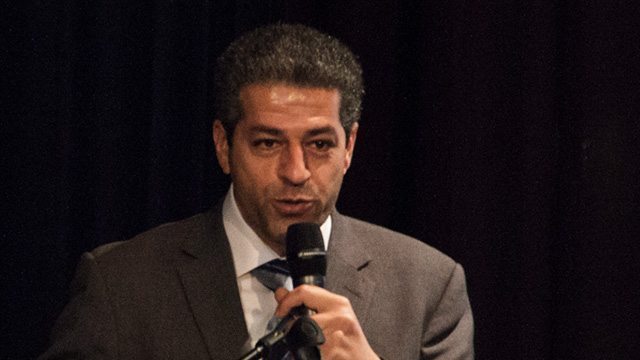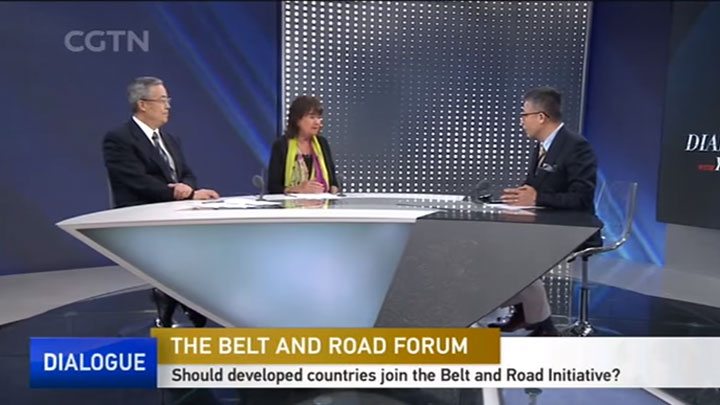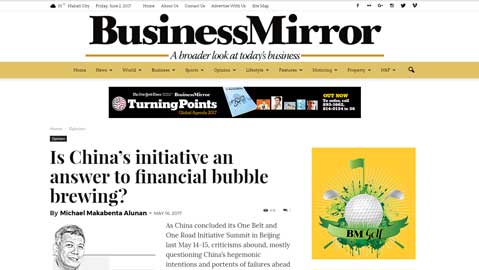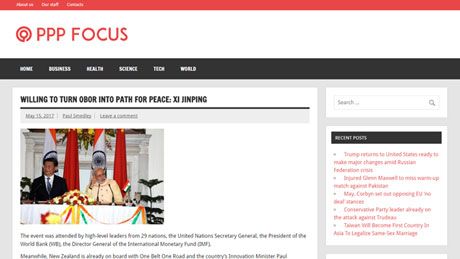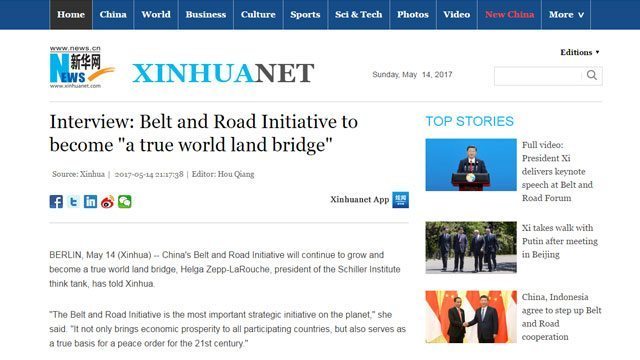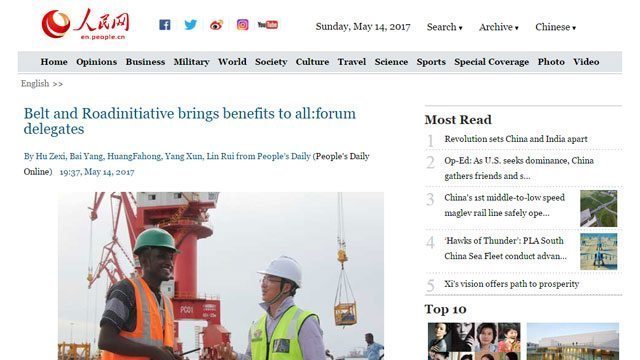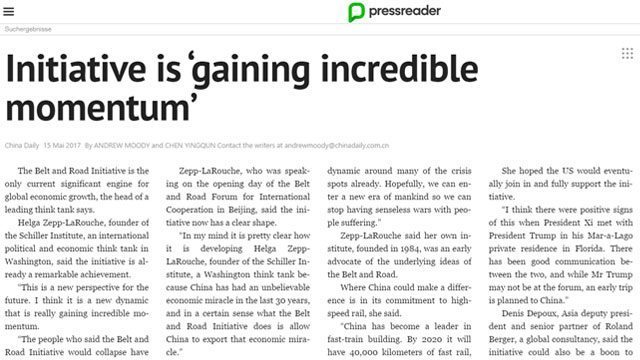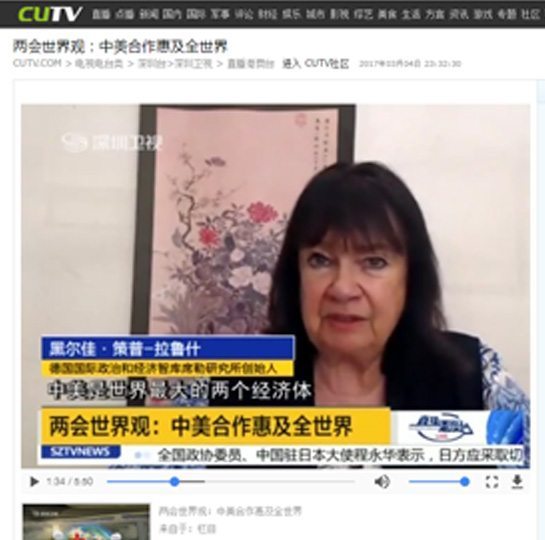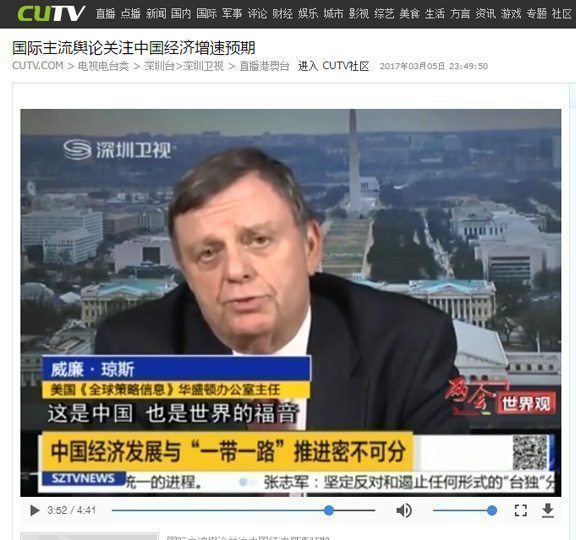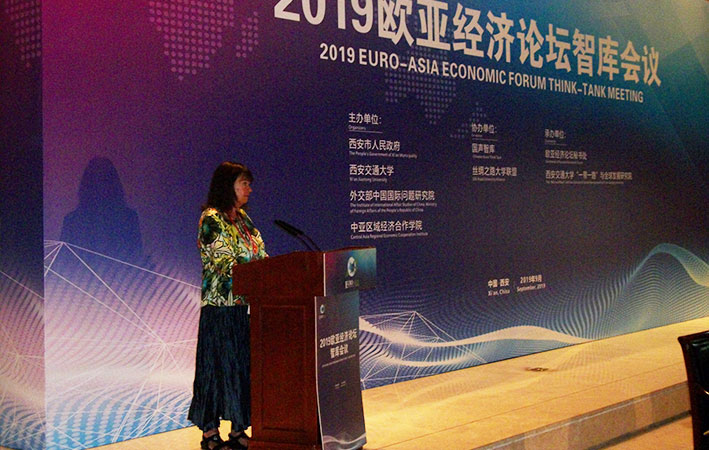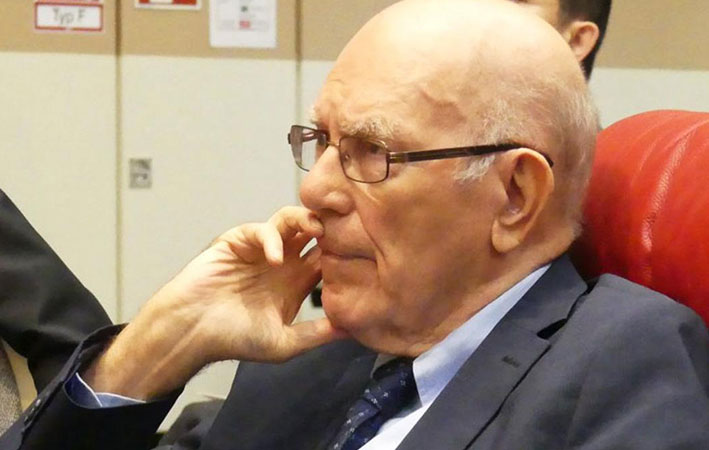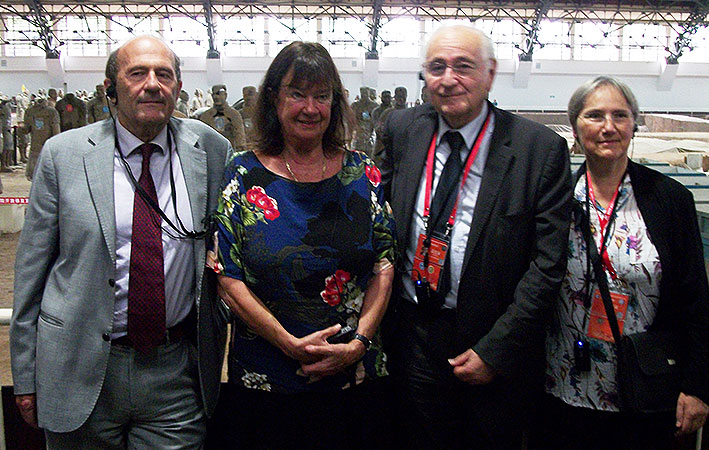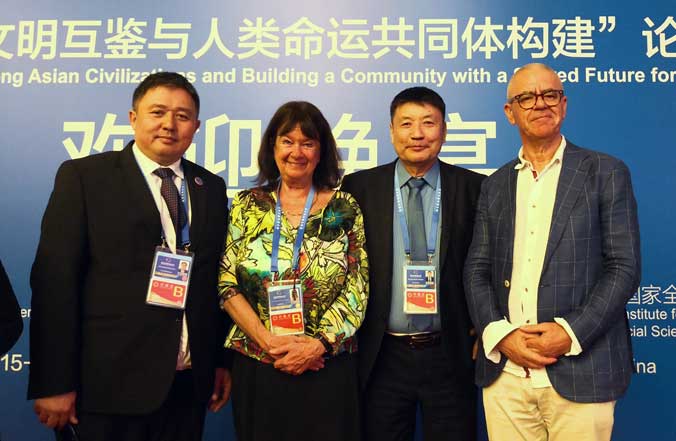Schiller Institute founder Helga Zepp-LaRouche has just returned from a 10-day visit to China, including public presentations and private meetings, which she stated went exceptionally well.
The trip began with her participation in the Conference on Dialogue of Asian Civilizations, held May 15-16 in Beijing, where President Xi Jinping delivered the keynote. Zepp-LaRouche presented a paper and a 10-minute speech, with the title “The Highest Ideal of Mankind Is the Potential of the Future,” which has already been published as part of the Conference proceedings. We feature it immediately below.
She also had daily, high-level meetings with representatives of many top institutions that she has been in touch with since the 1990s. She reported that these occurred at a moment of very grave tensions between China and the U.S.—because of the collapse of the trade talks, the Huawei affair, and other issues—which made her presence all the more important. Many people look to the LaRouche movement for solutions to these problems, she reported.
Zepp-LaRouche also delivered a speech at the Chongyang Institute for Financial Studies of Renmin University in Beijing, and granted a number of press and TV interviews.
In addition to Beijing, Zepp-LaRouche visited Nanjing where she met with the publisher of the Chinese-language edition of the first volume of “The New Silk Road Becomes the World Land-Bridge” special report, where she learned that the publisher had just published a second printing of that report, because they consider it one of the most important books of their publishing house. They also will be publishing a translation of the new report, “The New Silk Road Becomes the World Land-Bridge, Vol. II.”

The Highest Ideal of Mankind is the Potential of the Future
By Helga Zepp-LaRouche
It is the characteristic of turning points in history that the majority of people have no concept of what is occurring. Only those visionaries who have a clear idea of the positive potential of the future are able to intervene in the process at moments of decision, to avert potential catastrophes, and instead usher in a new epoch of humanity. We find ourselves in such a phase change: the old world order, as it developed after World War II and especially after the disintegration of the Soviet Union, is in a process of dissolution, but what the new order will look like is by no means decided yet. We are in a period when even international law seems to be overridden, as at the moment neither the UN nor any other institution seems to be able to enforce it.
But it is undeniable that the pendulum that favored Western civilization over recent centuries—though for thousands of years Asia had occupied an outstanding and even leading place in universal history—has long been swinging back. This is clearly supported by the demographic development of Asia, completely new strategic interventions such as the Belt and Road Initiative (BRI), and clear objectives, such as the concept “Made in China 2025” or the outlook that President Xi Jinping has set for China by 2050.
Tremendous opportunities for Asia arise from this, and perhaps along with them a completely new form of responsibility, which should ignite the inspiration to work out concepts about how to advance humanity as a whole. President Xi Jinping obviously has this very approach in mind when he speaks of the “Community of a Shared Future of Mankind.” We are now experiencing a precious moment, for never before in history has the conscious design of a new epoch, with the idea of a unified humanity as a higher idea, been so clearly defined as a task. If we want to create a more human order, it must be built on the best concepts that have been produced by various cultures. Those concepts must, so to speak, have an ontological character, because nothing in them can be accidental or of merely contemporary character, if they are to determine the Dharma—the moral codex—which the spiritual leaders, and with them Asian societies, are to follow in this new chapter of universal history.
It is also obvious that the impetus for defining this “righteous way” must come from the ancient traditions of Asia, such as Confucianism, Buddhism or Jainism, which are clearly linked to a commitment to lifelong self-cultivation and moral refinement of mankind. Though the West had the same claim in its Classical and Renaissance periods of humanism, the idea of the ethical improvement of man as a purpose in life is almost the opposite of the Western liberal model, where any priority of moral requirements or the superiority of one philosophy over another are emphatically rejected.
How then must the principles be designed, so that the new paradigm of a coming Community of Mankind is on such secure foundations that the requirements of modern natural science as well as those of a new system of international relations can be satisfied?
This question must be answered on different levels. A good starting point is The Five Principles of Peaceful Coexistence, or Panchsheel, as laid down for the first time in a formal way in the Trade and Transport Agreement between the Tibetan Region of China and India on April 29, 1954. The preamble states that the two governments have agreed on the following principles: 1. Mutual respect for each other’s territorial integrity and sovereignty, 2. Mutual non-aggression, 3. Mutual non-interference, 4. Equality and mutual benefit, and 5. Peaceful co-existence.
The first conference of independent Asian and African states in Bandung in 1955, led by Chinese Prime Minister Zhou Enlai and Indian Prime Minister Jawaharlal Nehru, expanded the Five Principles into the Ten Principles of Bandung. The same principles were underlined as a core element of international law at the 1961 Non-Aligned Conference in Belgrade. With the BRI, China has defined for the first time the concept of this relationship between nations as the basis of a global reorganization which is open to all nations. President Xi emphasized in his keynote speech at the first Belt and Road Forum in May 2017,
“We are ready to share the experience of development with other countries. We have no intention to interfere in other countries’ internal affairs, export our own social system or model of development, or impose our will on others.”
These principles of peaceful coexistence have deep roots in several Asian cultures. Some of these concepts are philosophical in nature, others are part of theological considerations. This article is about the identification of the approaches that have advanced humanity and are relevant to the future understanding among peoples. This is also the approach adopted by President Xi on his overseas visits, as he emphasized in a speech in New Delhi to the Indian elite in 2014:
“Even in ancient times, people in China came to the realization that a belligerent state, great as it may be, ultimately fails. Peace is paramount. Harmony without uniformity, and universal peace must be achieved. The Chinese concepts of ‘universal peace’ and ‘universal love’ are very similar to the Indian concepts of ‘Vasudhaiva Kutumbakum’ (the world as a family) and ‘ahimsa’ (do not inflict injury).”
Thus, in the ancient scriptures of India, the Vedic texts, the Upanishads, and the classical Sanskrit literature, there are many important concepts that have both a religious and a practical political significance. This includes, for example, the principle of ahimsa mentioned by Xi, the respect for all other creatures—not only the renunciation of any physical violence, but also of hurting the other in any way, either verbally or spiritually. Ahimsa is also a method of war prevention and conflict resolution, even for complex challenges in the real world.
The collections of the Rigveda are the oldest surviving complete literary work, and have been handed down orally for centuries with the help of sophisticated mnemonics. In the Rigveda there are fundamental thoughts on the cosmic order, which ultimately also provide the guideline for human action on earth.
In the Upanishads there are five principles that reflect the same basic orientation. The most basic concept is that of the all-embracing Brahman. “Ishawaram idam sarvam jagat kincha jagatvam jagat”—Everything that exists, wherever it exists, is permeated by the same divine power. This idea is found in a similar form in Gottfried Leibniz’s idea of the Monad, where within every Monad the entire lawfulness of the universe is contained.
The second principle is that the Brahman, the creative principle whose expression is the entire realized world, is in every individual consciousness, the Atman. Atman is the reflection of this all-embracing Brahman. It is the individual consciousness, but it is not fundamentally separate from Brahman. “Ishwara sarvabhutanam idise tishtati”—the Lord dwells in the heart of every individual. The relationship between Atman and Brahman is the core around which the whole Vedic doctrine revolves. In the philosophy of Nicholas of Cusa, this corresponds to the affinity of the macrocosm and the microcosm, which makes it possible for an intangible force—an idea created by creative reason—to bring about a further development of the physical universe.
A third Vedic principles is that because of their common spirituality all people are members of a single family. The Upanishads speak of humanity as amritashya putra, “Children of Immortality.”
The fourth concept the Upanishads present is the idea of the consubstantiality of all religions, all spiritual paths. “Ekoham svat virpra bahuda vadanti”—“The truth is one, the sage calls it by many names.” This idea corresponds to the “Sanatana Dharma,” the single religion which stands above all religions, an idea also expressed by Nicholas of Cusa in his Platonic dialogue “De Pace Fidei,” which he wrote immediately following the fall of Constantinople in 1453 and the associated bloody conflicts. In this dialogue, representatives of various religions and nations turn to God for help, because all of them are fighting wars against and killing each other in His name. God instructs them that they are all also philosophers in their respective nations and religions—beyond all religious traditions and teachings of the different prophets—and therefore can understand that above religion there is one God, and above different traditions, one truth. Incidentally, the Hindu Monk Swami Vivekenada cited the same argument in his famous speech before the World Parliament of Religions in Chicago on September 11, 1893: The followers of different religions have argued and fought each other purely because their point of view is too narrow, and they don’t grasp that the highest Being is infinite.
A fifth Vedic concept is that of the welfare of all creatures. “Bahujana shukhaya bahujana hitaya cha”—the Hindu philosophy seeks “the good of all people and all forms of life on this planet.” The affinity to the Confucian ideas of harmonious development of all is evident, as Confucius says explicitly: “They who have success should help others to succeed.” Naturally, this is the idea at the basis of the BRI and the conception of “win-win cooperation” between various nations. The Confucian philosophy also gives a name to the new era which was to begin with the prospective Japanese Emperor Naruhito: “Reiwa,” which literally means “pursuing harmony.” Japanese commentators emphasize that this term reaches back to the famous classical poetry anthology, “The Poem of Manyoshu,” though as the scholar Wang Peng points out, the term ling-he was used by the ancient Chinese emperors as the name for their reign, just as in present day China there are best wishes for peace and harmony.
The idea of a harmonious development of all as the basis for a world peace order is thus laid out in several Asian cultures, and stands in direct contradiction to the idea that relationships among nations constitute a zero-sum game. However, its realization in practice obviously requires a new stage of development in the evolution of mankind, the Age of the Spiritual Man, as Sri Aurobindo has expressed it; or the increasing dominance of the Noösphere over the Biosphere, in which Vladimir Vernadsky saw a trajectory laid out by the natural law of the universe.
The universe has an inherent lawfulness which advances it to higher stages of development. Vernadsky saw the creative reason of mankind as an essential component of that universe, as a geological power, which has been qualitatively advancing this higher development since the existence of human evolution. In the science of physical economy, Lyndon LaRouche delivered the proof of the absolute efficiency of human creativity, which distinguishes man from all known living creatures, with his concept of Potential Relative Population Density.
Yet this anti-entropic higher development is neither linear, nor the automatic result of objective processes—as in the variations found in historical or dialectical materialism, for instance—as, along with the objective effect of newly discovered physical principles in production processes, now a substantial component of this process has become the subjective intellectual and moral higher development of man.
In meeting the task of consciously shaping a new paradigm for humanity stated at the beginning of this article, it is certainly an enormous advantage for Chinese and other Asian cultures that, thanks to the philosophy of Confucius, the development of a moral character has been the most important goal of education in broad areas of Asia. Despite the considerable hype about the digitalization of the economy and the roll of artificial intelligence in future economic platforms, it will always be a question of the moral qualities of human beings which will determine whether the new technologies are deployed for the benefit of mankind, or for evil purposes. Thus, of first-rank strategic importance is the letter written several months ago by Xi Jinping to eight professors of the Chinese Academy of Fine Arts, where he emphasized the extraordinary importance of aesthetic education for the mental development of the youth of China. Aesthetic education plays a definitive role in the development of a beautiful soul, filling the students with love and promoting the creation of great works of art.
Thanks to the continual influence of Confucianism—only broken by the ten years of the Cultural Revolution—there is a continuing tradition going back thousands of years in which the development of a moral character represents the highest goal of education. It is thus taken for granted in China that attention to public morals and combating bad characteristics in the population constitute the precondition for a highly developed society. For example, the Court Report on Educational Goals of the Academic Ministry of the Qing government in 1906 required, above all course content, the teaching of public morals (gongde) and Confucian teachings on virtue, in order that “each has concern for others as he does for himself, and loves the state as one loves his own family.”
A key to understanding the special significance of aesthetic education in China today, however, lies not only in the teachings of Confucius—who assigned a crucial role in the development of a moral character to the occupation with poetry and good music—but in the scholar who has influenced China’s modern education system more than anyone else: the first Minister of Education of the Provisional Republic of China, Cai Yuanpei. Cai acquired the academic title of xiucai at the age of 15, due to his extraordinary intelligence and diligence, the highest title jingshi at age 24, becoming a bianxiu in 1894—and at the age of 26 had reached the highest level of academic career in the Qing dynasty. He had excellent knowledge of the classical script and was famous for his beautiful classical style.
During this time, Cai, along with the entire Chinese elite, was shocked that China was defeated in the war against Japan, and had generally lost out in every invasion since the Opium Wars, paying high reparations and ceding rights to the invaders. Among intellectuals, it was discussed how Japan—which for centuries was considered backward—had become so strong through the Meiji Restoration, and they sought to learn the lesson of this transformation.
The corruption of the Qing dynasty was also blamed for these disgraceful defeats. Cai was convinced that the state would only survive if there was a change in the consciousness of the people, and that this improvement could only be achieved by improving the content of education. Cai first began to investigate the Japanese and then the European educational systems. Finally, he traveled to France and Germany, where he studied civilizational and cultural history of the West in Leipzig from 1907 to 1911, before he was appointed as Minister of Education by Sun Yat-sen in 1912.
Cai undertook in-depth studies of the aesthetic writings of Alexander Gottlieb Baumgarten, Immanuel Kant and Friedrich Schiller, as well as the concept of education of Wilhelm von Humboldt. Inspired by the excellent studies on the history of philosophy of Wilhelm Windelband, and by direct study of Kant, Schiller and von Humboldt, he realized very quickly that Schiller’s conception of aesthetic education was not only in complete affinity with Confucian morality—Schiller’s concept of “the beautiful soul” completely corresponded with the Confucian idea of the junzi—but Schiller spoke about these questions with greater clarity and from a higher point of view than any earlier or contemporary philosophers. “The comprehensive theory of Friedrich Schiller and the idea of aesthetic education brought great clarity to everyone,” writes Cai. “Since that time, the European idea of aesthetic education can supply us with a great deal from which we can draw for developing our own understanding of the subject.” Cai Jianguo further quotes Cai Yuanpei: “In Germany, aesthetic education impressed me greatly. I want to use all my powers to promote them.” Cai created the Chinese term meiju, which had not previously existed in that language.
Schiller wrote the “Aesthetic Letters” in response to the failure of the French Revolution, and argued that from then on, any improvement in the political realm can only come from the ennoblement of the individual. Only if man rises above the transient happiness of the world of the senses, and engages his efforts not only for himself, but the community; not only for the present, but the future; not for physical pleasure, but spiritual creativity; only then could the state prosper. In the “Letters” and in further pioneering writings on aesthetics, Schiller developed why this ennoblement of character can be achieved by immersion in great classical art.
Cai Yuanpei recognized the striking coincidence between the teachings of Confucius and the aesthetics of Schiller. The immersion in poetry, music, and painting during one’s leisure hours awakens in the beholder an aesthetic pleasure in which lies neither a desire for nor a rejection of the sensible world. Rather, the taste is formed and the emotions are ennobled. Aesthetic sensibility embraces beauty and sublimity, thus forming a bridge between the sensual world and reason. Every human being has a mind, but not everyone is capable of producing great and noble deeds. Therefore this mind must become stronger as a driving force, by ennobling it.
In 1912, Cai wrote the “Theses on New Education” and the “Textbook on Moral and Personal Development for the Secondary School,” in which he characterized human conscience as the essential guide to behavior. In an essay of May 10, 1919, he wrote: “I believe that the root of our country’s problems is in the shortsightedness of so many people who want quick success or quick money without any higher moral thinking. The only medicine is aesthetic education.”
Of course, it should not go unmentioned that Cai, as president of the University of Beijing, led this institution to internationally recognized scientific renown, taking up many suggestions from Wilhelm von Humboldt, who established the unity of research and teaching, and the beauty of character as an educational goal at the University of Berlin. Because of Cai’s prestige, the University in Beijing soon became a magnet for many young Chinese scholars returning from overseas, just as he became the inspiration for many other art colleges and academies.
In my view, Cai Yuanpei’s conception of the state as a larger family in which the interests of the state must take precedence over the interests of individual families, is also of paramount importance for understanding the policies of President Xi Jinping and his idea of the “Community for the Future of Mankind,” because for him the prosperity of the state was the prerequisite for the happiness of the citizens. However, the interests of the world as the home of all living beings was also set before the interests of the individual state. Cai wrote: “Until the ‘great community’ of the world is realized, the interests of society cannot be identical with those of the world.” He also emphasized that in fulfilling the duty to the state, one must be careful not to contradict the duty of the world. He dreamed of a “great community” of the entire world, (datong shijie), which would be peaceful and harmonious, without class distinctions and state boundaries, without armies and war. All humans would understand each other in this world community and help one another. Cai saw the “Dialogue of Cultures” as the pathway to this goal: “I have often thought that a nation must necessarily absorb the culture of other peoples. This is like the body of a human being who cannot grow without breathing the air of the outside world, without eating and drinking.” Yes, he saw in this meeting of cultures the absolute prerequisite of higher development: “If one takes a look at the development of the world history, one sees that the confrontation of different cultures always leads to the emergence of a new one.”
The realization of this vision is absolutely identifiable through the dynamism and the “Spirit of the New Silk Road.” The principles that must determine the “righteous path” for the new paradigm are not static axioms, but consist of the prospects arising from the aesthetic education of, eventually, all human beings. In a world where economics is not based on the principles of profit maximization and the greatest possible satisfaction of individual greed, but on the best possible promotion of human creativity as the motor of an anti-entropic developing universe; if, so to speak, the “cosmic order” inspires political, economic and cultural life, then the dreams of Confucius, Schiller, Cai Yuanpei, Xi Jinping and Lyndon LaRouche are the political legislators of humanity. As Tagore expressed it in his famous dialogue with Einstein: “When our universe is in harmony with people, we feel the eternal that we know as truth, as beauty.”








